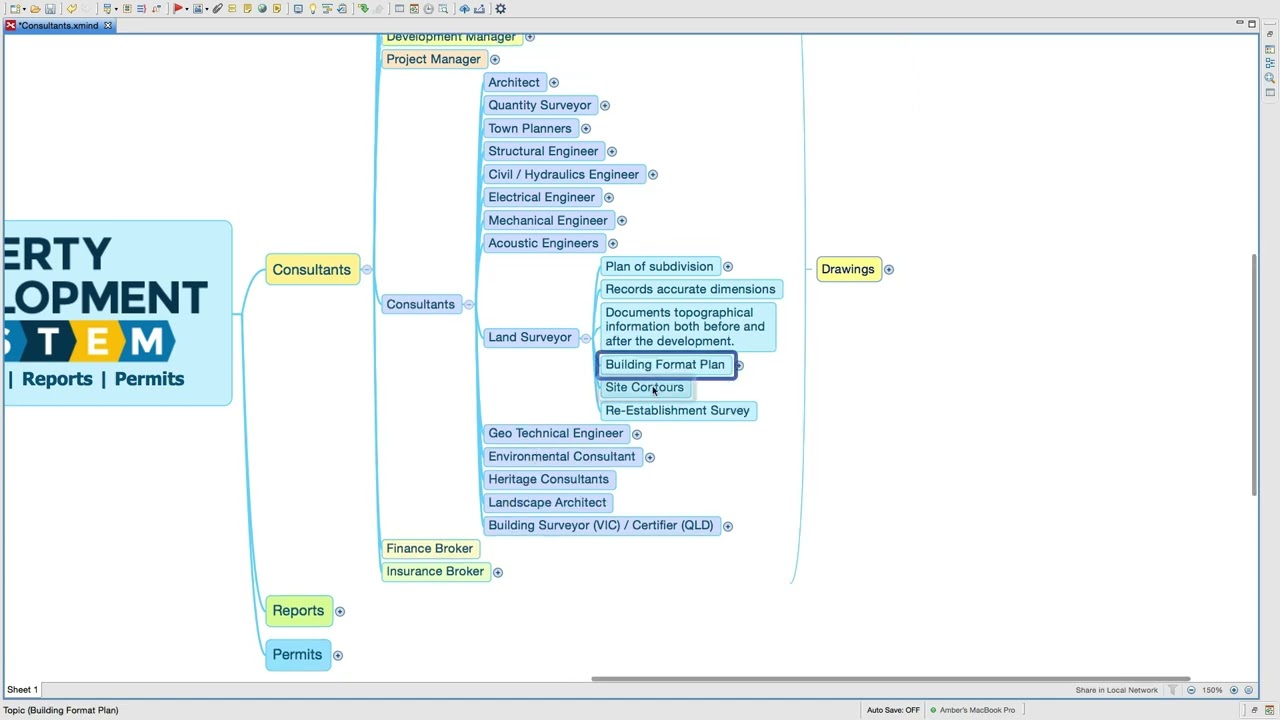Consultants Part 3
Here is an in-depth look at the various experts involved in the construction process, highlighting their specific roles from civil and mechanical engineers to environmental consultants and building surveyors.
This segment emphasises the necessity of multidisciplinary collaboration for successful building development.
In this segment, various professionals and their roles in the construction process are highlighted, emphasising the importance of multidisciplinary expertise in building development.
Civil Engineers
Focus on fluid elements like stormwater drainage, water supply, and sewage.
Electrical Engineers
Handle electrical layouts and installations.
Mechanical Engineers
Deal with heating, cooling, and air conditioning systems.
Acoustic Engineers
Monitor and control noise levels, advising on noise barriers.
Land Surveyors
Offer precise topographical data before and after development, including subdivision plans.
Geotechnical Engineers
Provide soil reports, critical for structural planning.
Environmental Consultants
Assess the environmental impact of development, suggesting sustainable designs.
Heritage Consultants
Advise on restrictions related to heritage overlay areas.
Landscape Architects
Design the outdoor spaces and landscapes.
Building Surveyors/Certifiers
Ensure compliance with building codes and standards.
Finance and Insurance Brokers
Essential for funding and ensuring the construction process.
Insights based on numbers
- The role of each consultant is integral to ensuring the construction meets legal, safety, and environmental standards, underscoring the complexity and the interdependent nature of modern building projects.
Frequently Asked Questions
How do acoustic engineers contribute to reducing noise pollution in urban areas?
Acoustic engineers play a pivotal role in urban development by addressing and mitigating noise pollution, a significant concern in densely populated areas.
They use their expertise to design and implement solutions such as sound barriers along highways and noise reduction strategies in buildings, ensuring a quieter, more livable environment for city inhabitants. Through careful monitoring of noise levels and the creation of acoustic solutions, they help in significantly reducing the adverse effects of urban noise pollution.
What is the importance of environmental consultants in sustainable building design?
Environmental consultants are crucial for incorporating sustainable practices into building design, aiming to minimize the environmental footprint of new developments. They evaluate the impact of construction on the surrounding environment and recommend strategies to preserve natural resources, improve energy efficiency, and reduce waste.
By focusing on sustainable design, they not only ensure compliance with environmental regulations but also contribute to the creation of green spaces that enhance ecological health and community well-being. Their work ensures that developments are both environmentally responsible and sustainable for future generations.
How do building surveyors ensure compliance with building codes and standards?
Building surveyors, also known as certifiers in some regions, ensure that construction projects comply with relevant building codes and standards. They review and certify plans before construction begins, conduct inspections during construction to ensure adherence to approved designs and legal requirements, and issue compliance certificates upon completion.
This role is vital for maintaining safety, accessibility, and sustainability standards in building projects, protecting both the occupants and the broader community. By enforcing compliance, building surveyors contribute significantly to the integrity and safety of the built environment.
What is the purpose of having different experts in the construction process?
Different experts or consultants play specialized roles in the construction process, ensuring that all aspects of building development meet legal, safety, and environmental standards. Their expertise helps in addressing the complex and interdependent nature of modern building projects, leading to successful development outcomes.
What roles do civil engineers play in construction?
Civil engineers focus on fluid elements crucial to the construction process, such as stormwater drainage, water supply, and sewage systems. Their expertise is vital in ensuring that these systems are designed efficiently and sustainably.
How do electrical engineers contribute to construction projects?
Electrical engineers are responsible for the design and installation of electrical systems within a construction project. This includes planning the layout of electrical wiring and ensuring that the electrical installations meet safety standards.
What is the role of mechanical engineers in construction?
Mechanical engineers deal with the heating, cooling, and air conditioning (HVAC) systems of a building. Their work is essential in ensuring that the building’s climate control systems are effective and energy-efficient.
What do land surveyors do in the construction process?
Land surveyors provide precise topographical data before and after development, including plans for subdivisions. This information is crucial for planning and executing construction projects accurately.
How do geotechnical engineers contribute to construction?
Geotechnical engineers provide soil reports that are critical for structural planning. They assess the soil’s properties to ensure that the foundation and structural designs are suitable for the soil conditions.
How do heritage consultants impact construction projects?
Heritage consultants advise on restrictions related to areas with heritage overlays. Their guidance ensures that construction projects respect historical and cultural landmarks, complying with regulations protecting these sites.
What do landscape architects do in construction?
Landscape architects design the outdoor spaces and landscapes of a construction project. Their designs enhance the aesthetic and functional aspects of the outdoor environment, contributing to the project’s overall appeal.
How do finance and insurance brokers assist in construction?
Finance and insurance brokers are essential for securing funding and insurance for construction projects. They help manage financial risks associated with construction, ensuring that the project can proceed smoothly.
Test Your Knowledge
1. What is the primary role of civil engineers in the construction process?
A) To design building interiors.
B) To focus on elements like stormwater drainage, water supply, and sewage.
C) To handle electrical layouts and installations.
D) To ensure compliance with building codes and standards.
2. Which professionals are responsible for handling the heating, cooling, and air conditioning systems in a construction project?
A) Acoustic Engineers
B) Mechanical Engineers
C) Electrical Engineers
D) Civil Engineers
3. The role of geotechnical engineers is critical for:
A) Electrical installations.
B) Noise control.
C) Structural planning.
D) Landscape design.
4. Environmental consultants are crucial in a construction project for:
A) Providing soil reports.
B) Assessing the environmental impact and suggesting sustainable designs.
C) Offering precise topographical data.
D) Advising on heritage restrictions.
5. What is the significance of multidisciplinary collaboration in building development, as highlighted in the article?
A) It is necessary for aesthetic purposes only.
B) It ensures that the construction process is funded adequately.
C) It is integral to meeting legal, safety, and environmental standards.
D) It is optional and not necessarily beneficial to the project.
6. Which consultant’s role is to ensure the project complies with building codes and standards?
A) Land Surveyors
B) Building Surveyors/Certifiers
C) Finance and Insurance Brokers
D) Heritage Consultants
7. Who provides critical topographical data before and after development, including subdivision plans?
A) Geotechnical Engineers
B) Environmental Consultants
C) Land Surveyors
D) Mechanical Engineers
8. The involvement of heritage consultants is most crucial when the project:
A) Involves high-tech electrical installations.
B) Is located in heritage overlay areas.
C) Requires extensive soil testing.
D) Needs an acoustic design.
Answers:
- B) To focus on elements like stormwater drainage, water supply, and sewage.
- B) Mechanical Engineers
- C) Structural planning.
- B) Assessing the environmental impact and suggesting sustainable designs.
- C) It is integral to meeting legal, safety, and environmental standards.
- B) Building Surveyors/Certifiers
- C) Land Surveyors
- B) Is located in heritage overlay areas.
Assignment
Practical Exercise: Understanding the Roles of Consultants in Construction
Objective:
The goal of this exercise is to deepen your understanding of the roles and responsibilities of various consultants involved in the construction process, and the importance of multidisciplinary collaboration for successful building development.
Instructions:
You will be divided into groups, and each group will be assigned the role of a different consultant involved in a hypothetical construction project. Your task will be to outline your responsibilities, identify how you would collaborate with other consultants on the project, and present your findings to the class.
Roles:
- Civil Engineers
- Electrical Engineers
- Mechanical Engineers
- Acoustic Engineers
- Land Surveyors
- Geotechnical Engineers
- Environmental Consultants
- Heritage Consultants
- Landscape Architects
- Building Surveyors/Certifiers
- Finance and Insurance Brokers
To Do’s for Each Group:
Research and Outline Responsibilities:
- Identify and outline the primary responsibilities of your assigned consultant role in the construction process.
- Highlight specific tasks you would be expected to perform.
Collaboration Scenario:
- Develop a scenario that demonstrates how your consultant role collaborates with at least two other consultant roles in the construction process.
- Describe the challenges that might arise during this collaboration and propose solutions.
Case Study Analysis:
- Find a real-world construction project where your assigned consultant role played a crucial part. Briefly describe the project and your role’s impact on its success.
- Reflect on any challenges faced and how they were overcome.
Presentation:
- Prepare a presentation of your findings, including a brief overview of your role, the collaboration scenario, and the case study analysis.
- Highlight the importance of your role in ensuring the project meets legal, safety, and environmental standards.
Research Questions:
- What are the most common challenges faced by your assigned consultant role in construction projects?
- How does your role contribute to sustainable building practices?
- What technologies or tools does your role typically use to accomplish its tasks?
- How has the role of your assigned consultant evolved in the last decade?
Submission Requirements:
- A written report that includes the outline of responsibilities, the collaboration scenario, case study analysis, and answers to the research questions.
- A PowerPoint presentation for the class presentation.



